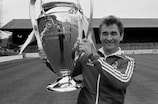Why UEFA President's Award-winner Arrigo Sacchi is one of the all-time coaching greats
вторник, 23 августа 2022 г.
Вводный текст
Under UEFA President's Award-winner Arrigo Sacchi, AC Milan won back-to-back European Cups and his methods changed Italian football, influencing a generation of coaches – not least Carlo Ancelotti.
Главное фото/видео

Текст статьи
UEFA President Aleksander Čeferin has paid tribute to one of the world's all-time leading football coaches, Arrigo Sacchi, by selecting him as the winner of the 2022 UEFA President's Award.
UEFA.com explains why the Italian belongs among the greats.
The evidence
• Relatively unknown when he joined AC Milan in 1987, Sacchi led the Rossoneri to back-to-back European Cups in 1988/89 and 1989/90.
• Guided Italy to the 1994 FIFA World Cup final, losing on penalties to Brazil.
• Transformed the Italian mentality with his attacking style; his protégés include four-time UEFA Champions League-winning coach Carlo Ancelotti.
The expert testimony
"Arrigo completely changed Italian football – the philosophy, training methods, intensity, tactics. Italian teams used to focus on defending but our team defended by attacking and pressing."
Carlo Ancelotti, former Milan midfielder
"Until his arrival, players never gave everything in training; we were used to saving energy. He convinced us that to give 100% in matches you must also do the same in training. We learned a lot from Sacchi."
Mauro Tassotti, former Milan defender
"As a player it was tough because he was a perfectionist – asking for the maximum in every single training session – but that was probably the key to our success."
Marco van Basten, former Milan striker
"Sacchi started a revolution in Italian football, both mentally and tactically. We developed our style of play and we tried to impose it on all opponents, from amateurs in a midweek training game to Real Madrid at the Bernabéu."
Roberto Donadoni, former Milan midfielder
"We are incredibly proud they compared [our Barcelona side] to Sacchi's Milan. That was a side that made football history."
Xavi Hernández, former Barcelona midfielder
"Very few people have reshaped the philosophy of the game in the way that Arrigo Sacchi has managed, so that the sport itself can be observed in two eras – pre- and post-Sacchi. The endless tactical innovations he introduced are today the foundations of any footballing playbook, mirrored by generations of coaches who have followed."
Aleksander Čeferin, UEFA President
The back story
A defender at amateur level while working in his father's shoe factory, Sacchi coached in the lower leagues in the Romagna region, steered Cesena to a national youth title in 1982, then took charge of Rimini in Italy's third division. After a subsequent stint with Fiorentina's youth team, he coached Parma to promotion from Serie C1 and eliminated Nils Liedholm's Milan from the 1986/87 Coppa Italia – a feat that convinced Rossoneri president Silvio Berlusconi to hand him the reins in July 1987.
The method
Committed to concepts like "collective intelligence", Sacchi wanted "11 active players in every moment of the game"; one notable training device was playing full matches without a ball, telling players where the imaginary ball was so they could position themselves accordingly. Sacchi's sides operated a 4-4-2 with zonal marking, a high defensive line and an efficient offside trap, also pressing opponents hard. When critics said he could not coach a big club because he had never played at a high level, his response was: "I never realised that to be a jockey you had to be a horse first."
The take-home quotes
"My Milan side was like a positive example for everyone. The team showed everyone that it was better to attack than to be attacked; that it was better to dominate a game than to leave it to others. Hard work, inclusion, beautiful football, fun and innovation were elements that had to be pursued. For me, an undeserved victory was not a victory."
"The only way you can build a side is by getting players who speak the same language on the pitch and can play a team game. You can't achieve anything on your own, and if you do, it doesn't last long."
"My Milan team was brilliant because it was full of great professionals who wanted to be together and have fun."
"A victory may stay in the record books, but the way you achieve it will remain in people's minds."
"My Milan team didn't run more than the others. We just ran better."
- Brian Clough: football's ultimate iconoclast
- Johan Cruyff: the man who reinvented Barcelona
- Vicente del Bosque: Madrid and Spain's soft power
- Sir Alex Ferguson: United's master tactician
- Helenio Herrera: the king of catenaccio
- Udo Lattek: Bayern's 1970s kingpin
- Valeri Lobanovskiy: the soccer scientist
- Rinus Michels: the architecht of 'total football'
- José Mourinho: the 'Special One'





